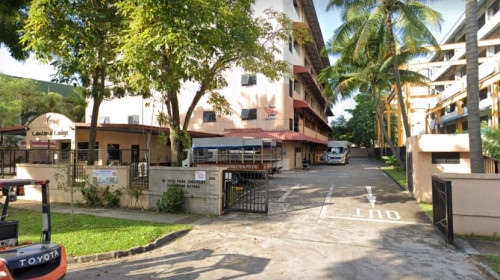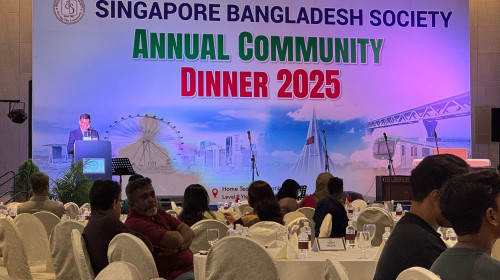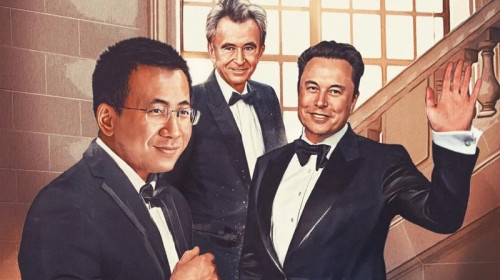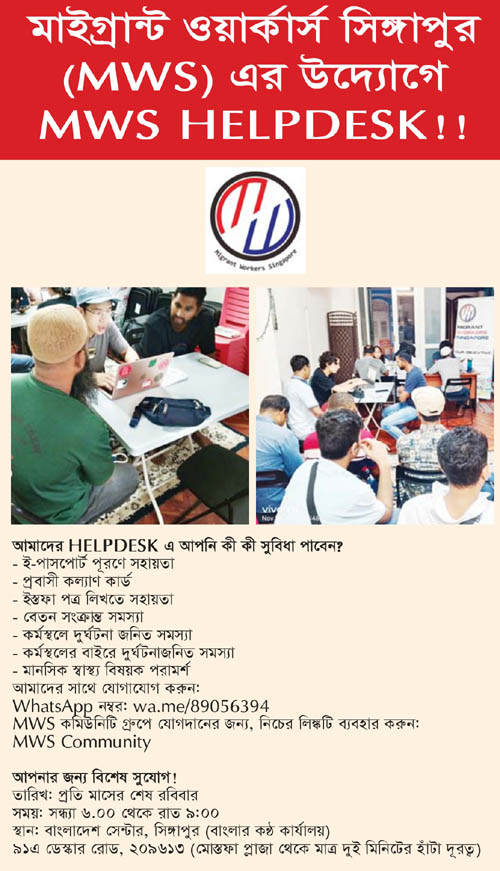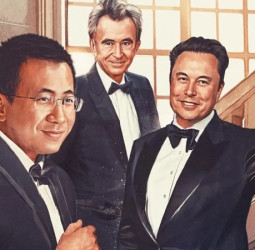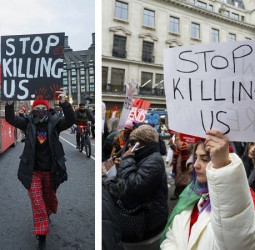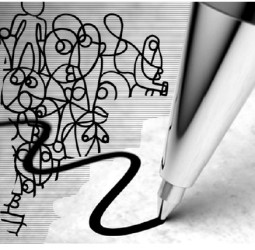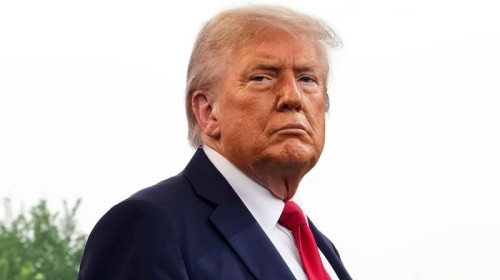Dark Money’ Is Tainting Washington Think Tanks. A New Report Shows It’s Worse Than You Think.
Washington’s think-tank industry, which sets the terms of debate for so much of American policymaking, is floating on a sea of foreign-government and Pentagon-contractor dollars.
That’s the conclusion of a brand-new report out this morning and shared with me by a pair of scholars at the Quincy Institute for Responsible Statecraft, a think tank that officially eschews foreign-government money — and delights in tweaking the Beltway foreign-affairs establishment.
Among other things, the paper says that the top 50 think tanks took in some $110 million over the past five years from foreign governments and related entities, including nearly $17 million from the United Arab Emirates, the largest single foreign donor. Leading Pentagon contractors, meanwhile, kicked in nearly $35 million over the same period.
The Atlantic Council and the Brookings Institution topped the list of foreign-government beneficiaries, taking in nearly $21 million and over $17 million, respectively. All in all, 54 different governments contributed to the industry, a list largely made up of pro-western democracies but also including fantastically wealthy authoritarian regimes like Saudi Arabia and Qatar.
Most disturbingly, the report makes clear that the numbers it cites may only be partial: Unlike traditional PACs or registered foreign agents, think tanks don’t have to disclose where their money comes from. Researching the study, co-authors Ben Freeman and Nick Cleveland-Stout told me, meant poring through the organizations’ annual reports in hopes that information would be voluntarily shared.
“More than a third of the top foreign policy think tanks in the US don’t disclose any donor information,” said Freeman. The category encompasses 18 of the 50 biggest think tanks, including highly-regarded Beltway stalwarts like the American Enterprise Institute or the Washington Institute for Near East Policy. “We really have no clue whatsoever who is funding them. We call these organizations dark money think tanks.”
That particular loaded term — lifted from the secretive political groups legalized by the Supreme Court’s Citizens United decision — is no accident.
According to Freeman and Cleveland-Stout, the typical think tank in 2024 looks a lot more like an advocacy group than a university. The paper doesn’t get into analyzing whether specific white papers were bought and paid for, but the implication is clear: Between media appearances, Congressional testimony and serving as mini governments-in-waiting for whatever party is out of power, the organizations do a lot to shape the political conversation, or at least set the boundaries of what views Washington deems respectable.
As such, they say, Americans have a vested interest in knowing who’s underwriting the opinions.
There are a couple of problems with that ask. One is the U.S. Constitution, which rightly makes it hard for the government to simply order a private organization to open up its books. The second is the self-conception of a lot of think tanks, which often cast themselves as high-minded research organizations rather than outfits involved in the grubby business of lobbying. This mindset underlies some of the reluctance to just lay out the finances voluntarily.
I think it’s time to get over that. In a low-trust moment where the policy views of many think tanks are about to face unprecedented assault, they should be going above and beyond to demonstrate that they’re legit. Hiding behind their researchers’ PhDs — as if they were ivory-tower philosophy professors who couldn’t even find their way to the bursar’s office — won’t cut it.
If the end result is that think tanks’ scholarly self-conception gets muddied up a bit, that’s probably good news for Washington’s culture, even if it dents a few researchers’ egos.
To get a sense of why, you don’t have to look further than the most recent foreign-entangelement scandal to roil the think tank world: last summer’s arrest of Council on Foreign Relations scholar Sue Mi Terry on charges of improperly working for the South Korean government.
What was notable about the affair was not any purported outrageousness: Terry allegedly accepted pricey handbags in exchange for publishing relatively conventional op-eds that largely echoed both Korean and U.S. establishment views. She’s denied the charges, and my hunch is that the case against her will be less than a slam dunk in court. Yet the illustrative fact is that so much of what she’s accused of doing is just a sloppier version of the perfectly legal status quo. (South Korea has given at least $4.4 million to top think tanks since 2019, according to the Quincy paper.)
The real question the news ought to raise is: Why is a think tanker’s work worth the investment by a foreign government, legal or otherwise? It’s because the organizations have a cachet in our never-ending political wars.
In fact, the Quincy report is a pretty good example of think tank work as political advocacy. This particular think tank, after all, is not an organization dedicated to the abstract question of transparency in policy research. Rather, Quincy describes itself as an “action-oriented” outfit working to “expose the dangerous consequences of an overly militarized American foreign policy and present an alternative approach.”
As an anti-interventionist redoubt, it channels the views of a lot of folks opposed to the internationalist Washington foreign policy “blob” — and presumably more inclined to suspect that the establishment’s views are bought and paid for by self-interested governments and military-industrial buckrakers. No wonder the report focuses on overseas or weapons-manufacturer money, as opposed to donations from Big Pharma or Silicon Valley or any other vested interest that might want to steer American policy.
Or, for that matter, donations from organizations linked to the Koch family or George Soros, both of which donate to Quincy. David Sacks, the tech mogul slated for an AI “czar” position in the Trump administration, has also contributed to the organization’s publication.
For his part, Freeman said he’d love to eventually see research on think tank donations from other sectors. The report currently ranks organizations based on their transparency, and will coincide with the launch of a funding tracker designed to enable readers to search foreign and military donations to think tanks the same way they can search for donations to elected officials. Whatever the authors’ foreign-policy motivations were, it’s a smart and useful idea.
As for his own organization, Freeman said, the relevant thing is that we know who the donors are, which depending on your view of the benefactors may help put the group’s work in context, positive or otherwise: “I think the thread across all of our recommendations is this transparency. Think tanks should put all their cards on the table, then let the recipients of their information be able to judge for themselves.”
Alas, efforts to find ways to force policy organizations to reveal their donors have tended to die in Congress, and so-called “truth in testimony” policies — which require hearing witnesses to say whether any of the research money came from overseas — are relatively easy to evade.
Ditto the kinds of transparency enforced by the fourth estate rather than the government. When journalists quote people from advocacy groups, they tend to explain the group’s political orientation. But we often don’t do the same for think tank scholars, who get treated more like university professors than recipients of cash from vested interests. Most of the time when a think-tank scholar shows up in the media, the reporter doing the story is trying to write up a newsy foreign event or controversial Congressional bill on deadline, and is not inclined to do the research that would enable a “to be sure” paragraph about the talking head’s income stream.
When pressed about foreign donations, of course, think tanks typically cite ironclad policies that prevent donors from meddling in work product.
“Every donor must agree to the Atlantic Council’s Intellectual Independence Policy, which ensures the Atlantic Council retains strict intellectual independence for all of its projects and publications,” a spokesperson for the organization told me. “This means donors agree to the Council maintaining independent control of the content and conclusions of any products resulting from sponsored projects. To safeguard our independence, we have a strict policy for accepting funding from government sources.”
“Brookings and all its personnel are governed by robust policies on research independence,” said spokeswoman Jenny Lu Mallamo, noting that less than 10 percent of the budget typically came from foreign governments.
In real life, though, many ironclad policies can be porous. “If I had to bet I would say window dressing at worst and sincere good intentions at best,” said Enrique Mendizabal, who leads On Think Tanks, a think tank that researches (you guessed it) other think tanks. “Think tanks are rarely (if ever) independent. Think-tanking is all about navigating undue influences, playing funders against each other, hiding behind the evidence.”
And in a moment where there are more ways than ever of getting your views into the public-opinion slipstream, the old game has gotten harder. “The model is somewhat doomed,” Mendizabal said. “It is overtly political. When a think tank meets a prospective donor they sell their influence over public policy and their access to key policymakers and power brokers. They are attracting funders who want to change public policy. Funders who want to have an influence.”
Elsewhere in the world, foreign funding for NGOs has become a political flashpoint, particularly for authoritarians like Russia’s Vladimir Putin and nationalists like India’s Narendra Modi. There’s no saying that couldn’t happen in Trump-era Washington, though it’d be at least a little awkward given that many of the most opaque think tanks are on the right.
Instead, the danger is that the foreign governments, and the rest of the special-interest universe, stop seeing think tanks as a worthwhile investment.
If the second Trump administration is at all like the first, it will be a period notably light on influential white papers and difference-making wonk trends — but big on personal connections to the boss. Against that backdrop, there could be a lot less incentive for deep-pocketed types to underwrite the kind of research that aims to shape policy. For think tanks, which can’t rely on tuition dollars like universities can, that’s an enormously dangerous scenario.
One way to forestall it might be to preemptively make themselves a little more transparent.
You Must be Registered Or Logged in To Comment লগ ইন করুন?




